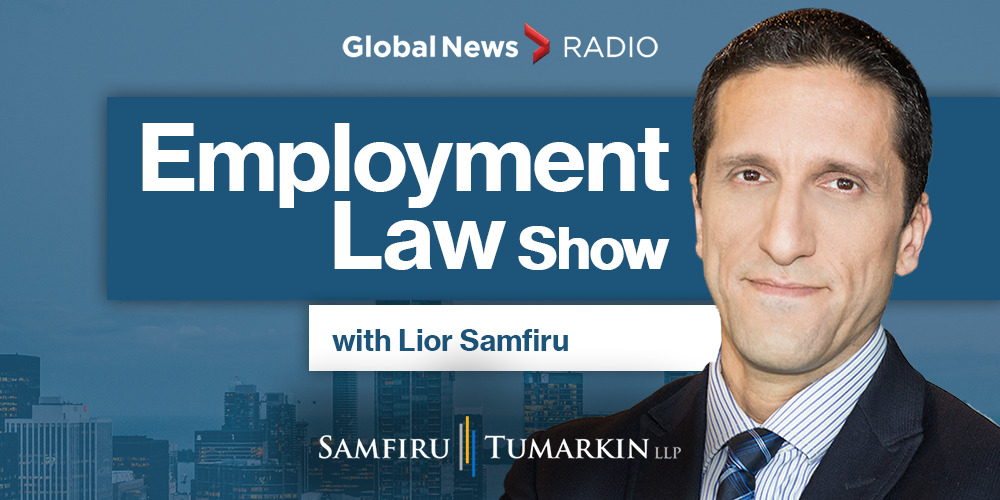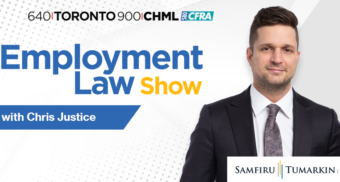Employment Law Show 640 Toronto – S10 E01

Episode Summary
What you should know about your workplace rights, employer obligations to health and safety, vaccination deadlines, and more on Season 10 Episode 01 of the Employment Law Show on Global News Radio 640 Toronto.
Listen below as Employment Lawyer Lior Samfiru, Partner at Samfiru Tumarkin LLP, reveals your workplace rights in Toronto, the GTA, Hamilton, London, and across Ontario on the Employment Law Show. Lior shatters myths and misconceptions about severance pay, terminations, workplace harassment, overtime pay, wrongful dismissal, constructive dismissal, duty to accommodate, independent contractors, and more.
Listen to the Episode
Episode Notes
I’ve worked as a trucker for 5 years, and last year my employer reduced my salary by $2 an hour and changed my route. Is this a constructive dismissal?
You’re right that the type of change you described could constitute a constructive dismissal. However, since the changes were made a year ago, you would be deemed as having accepted those changes by now. When there is a change made to your job, you have a window of a few weeks to a month to pursue constructive dismissal. The best thing for you to do right now is to submit an email (or something in writing) explaining that you do not agree to any future changes to your job. That way, if they try to make additional changes, there is a record of your objections, and you may be able to then do something about it.
There was a positive COVID-19 case at my work, and my manager then requested any employee who isn’t double vaccinated to speak to them. Should I tell my employer I’m not vaccinated? If I get fired, can I still get EI?
First, don’t assume that if you lose your job you would not get EI or severance. However, it is important that you don’t mislead your employer into thinking you are vaccinated when you are not. This is because if they find out that’s not true, they may have an argument that you mislead them and try to fire you for cause. It’s better to be honest. If you lose your job, reach out to my firm, and we can help you get severance as well as EI.
My friend is a unionized employee, and she’s been told if she doesn’t get vaccinated they’re going to let her go. She’s been working from home throughout the pandemic – aren’t they legally obligated to accommodate her?
If your friend’s employer does not meet their legal obligation to accommodate her, the only one that can help your friend is the union. A unionized employee is limited to what the union will do on their behalf, and they can’t pursue it on their own, for example, by hiring a lawyer. Your friend will have to bring the issue up with the union and see what they say.
LEARN MORE
Mandatory vaccinations and rights for Unionized Employees
I’m an employer, and I’d like to know if I want to hire somebody who is unvaccinated, at what point does my responsibility to the health and safety of the rest of my staff override an individual’s rights, or does it ever?
An employer’s responsibility to the health and safety of its workers does override an individual’s rights, but the question is, who decided what health and safety measures are required in a workplace. The answer is that the government decides and implements rules in terms of health and safety, whether we agree with them or not. Right now, the government has said that your workplace can be safe even if people are not vaccinated. That’s why they haven’t mandated the vaccine for workplaces, except for long-term care homes.
LEARN MORE
Vaccine Mandates by Government
My employer is requiring all employees to be vaccinated by January 31st, or employees will be put on administrative leave without pay. I am part of a union, and I have ten years before I retire. If I’m put on administrative leave, how would that affect my early retirement?
Since you are part of a union, you would have to ask the union how that will affect it because the answer would depend on what’s in the collective agreement. The union is the only one that can advise you about the terms of your employment, specifically, and what your rights are regarding early retirement.
I asked for a pay raise, and when my employer refused, I resigned. An hour later I changed my mind and told my boss I didn’t want to resign, but he said they wouldn’t take me back. What can I do?
This is what you call a heat of the moment resignation. In this situation, if you take it back within 24 hours, then your employer should take you back. But if they won’t take you back, then it becomes a termination, meaning they would have to pay you severance. Reach out to my firm and we will help you get your severance.
I have an employee who is consistently late. I’ve warned him many times, but before I could terminate him for cause he went on disability leave. What can I do?
Do not terminate your employee while they are on disability leave. Instead, once he returns to work, start giving written warnings in the form of a letter, documenting the lateness and poor attendance. If the lateness continues, at that point you may be able to terminate for cause. The important thing is that you have written records documenting the lateness and warning the employee that the situation needs to improve.
What you should know about your workplace rights
# 1 – Temporary layoffs and a reduction in hours or pay are still illegal right now
The new wave of the pandemic and the closures that come with it do not change what the law says as it relates to temporary layoffs. If you’re working for a business that’s still open and operating, and you’ve been laid off temporarily, you have the right to treat it as a termination and get your severance.
Some individuals have been on a layoff since the beginning of the pandemic – that’s going back to March 2020. If this is the case for you, maybe now is the time to decide to treat it as a termination. The reason you want to consider doing this is that you only have two years from when the layoff started to treat it as a termination and get your severance. If your layoff started in March 2020, you’re coming up on the limitation period to do something about it.
#2 – If you lose your job or are suspended because of your vaccine status, you may be owed compensation
When it comes to vaccines, it’s still the case that unless there’s a government mandate that applies to you, if you don’t get vaccinated and you are let go or you are put on a layoff or indefinite leave, you can treat that as a termination and require the company to pay you severance. In many cases, an employer will say they are letting you go for cause and that you aren’t owed severance – but that’s not the case. They do owe you severance, and you can still qualify for EI, as well.
LEARN MORE
Can My Employer Mandate the COVID-19 Vaccine?
#3 – Your employer must follow all health and safety rules and mandates that the government puts in place
Your employer has to take the pandemic seriously and has to take all measures that the government is implementing to ensure safety. That means ensuring masking, distancing, ensuring contact tracing where that’s required, to ensure that people that have symptoms are not working, that they’re allowed to take time off work and are not punished for doing so. Employers have an obligation to advise people if there’s an outbreak in the workplace. These are all things that your employer has to do, and if they don’t, that could be considered a constructive dismissal. You also have the right to refuse unsafe work. So, if you’re working in the workplace, and it’s unsafe because your employer is not doing what it’s supposed to, you can refuse work and you can’t be punished for that. If your employer isn’t taking this seriously, you have rights, and you can reach out to my firm and let us know if that happens.
#4 – New laws regarding non-competition agreements may make such agreements unenforceable
Last fall the government of Ontario has implemented some changes to the Employment Standards Act saying essentially that a non-competition contract or non-competition obligations are not enforceable. Meaning, even if you sign something that says you can’t work for a competitor of your current employer for a year, it’s not going to be worth the paper it’s written on.
There is an exception, and that applies in situations where you’re an executive. So if your job title starts with the word chief (chief executive officer, chief operations officer, etc.) then your employer is able to have you sign a non-compete and that is arguably enforceable. But for all other people, in fact, it’s not enforceable.
Now, your employer can still have a non-solicitation obligation, essentially saying if you leave us, you can’t go after our customers or clients. They can also obviously have confidentiality obligations, which says that if you leave us, you can’t disclose anything about what we do or anything that’s not in the public sphere. But going forward in 2022 and beyond those non-competition agreements are not going to be enforceable.
#5 – New laws regarding the right-to-disconnect may not protect employee’s rights
The government also recently introduced legislation that requires employers to have a policy in place regarding when an employee is allowed to disconnect from work after work hours. Unfortunately, this legislation may have little effect, because it only requires that an employer have a policy, it doesn’t specify what needs to be in the policy – that’s up to the employer. The legislation also doesn’t address the other issue that could arise regarding an employee’s right-to-disconnect, and that is that employees may wonder if they are disconnecting when work hours are over, whether it will be held against them. There may be a culture of answering emails after work hours, and if an employee doesn’t comply with what others are doing, they may wonder if it will prevent them from getting a raise or promotion.
#6 – Severance offers will likely get worse in 2022
Most of the time – over 90 percent of the time – with the severance offers reviewed by my firm, the person has been offered a lot less than they’re owed. The trend recently has been that the gap between what a person is owed and what they are offered is getting bigger. Some reasons for this could be the fact that some companies are struggling financially, or that employers may think that due to COVID-19 the law may have changed, and they can pay less severance. That’s not true at all. If you’ve been let go, you have to assume that you’re owed a significant amount more. If you’d like to find out what you’re owed, you can go to our Severance Pay Calculator and learn more.




